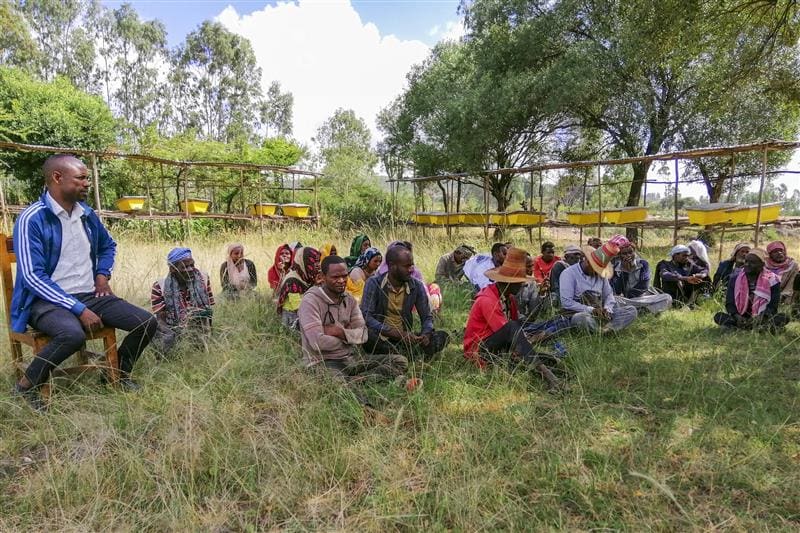In the scenic landscape of Halaba Zone, located in the Great Rift Valley in Ethiopia, lives a remarkable man named Temam Mosa, affectionately known as “Abamalabe” or “Father of Honey”. At the age of 70 years, Temam leads a group of 24 beekeepers in a thriving business that has become a point of hope and resilience in the community. For Temam, beekeeping is more than just a livelihood; it is a legacy of care and resourcefulness: “Since childhood, I have always wanted to help my family by utilizing the resources around us; now, my dream has become a reality.”
Temam’s experience serves as inspiration for the group. Thanks to his leadership, together, they produce more than 15 kilograms of honey per hive annually with an average income of 8250 Ethiopian birr (ca. $62). Beyond honey production, the byproducts and services the group provides generate additional income. Their services are offered to neighboring kebeles, benefitting over 200 households and transferring bee colonies, as well as providing training, bee forage guidance and disease control. This additional income has further strengthened their operations and established Temam’s reputation as a trusted expert in beekeeping.
In a project titled ‘Local-Level Land Degradation Assessment Towards Sustainable Land Management for Improved Livelihood in the Ethiopian Rift Valley’ or SMILE for short, the International Water Management Institute and its partners, the University of Aberdeen (UK) and Hawassa University (Ethiopia) work for improved community engagement.

Our efforts started through the UK Global Challenges Research Fund (GCRF) RALENTIR project that, through research and outreach, aimed to improve livelihoods and promote sustainable land restoration. Recognizing the potential of beekeeping to create change, in 2021, the project provided the group with beehives and supporting materials. Since then, Zone, Woreda and federal-level government officials have visited the group, and as recognition of their achievements, they have received additional support, such as a weighing scale and a honeycomb maker. These contributions have helped the group to grow their business, which now boasts 34 beehives and a capital of nearly one million ETB (ca. $7,500), beyond supporting sustainable natural resources management interventions.
Our aim with SMILE is to empower the community and implement business models that support the continued success of restoration efforts while enhancing livelihoods, focusing on impactful strategies that drive meaningful change.
The group’s success has rippled throughout the community, proving that collective action, mentorship and strategic support can unlock economic and social opportunities. The leadership from an experienced man, Temam, and the willingness of the younger generation to engage in beekeeping translated into lasting empowerment of communities, sustainability, and environmental restoration.
The support to the beekeeping collective is part of the ‘Local-Level Land Degradation Assessment Towards Sustainable Land Management for Improved Livelihood in the Ethiopian Rift Valley’ (SMILE) project, funded by the UK Foreign, Commonwealth and Development Office (FCDO) through its Reversing Environmental Degradation in Africa and Asia (REDAA) project.
















